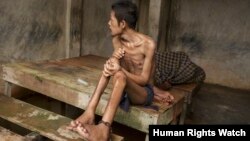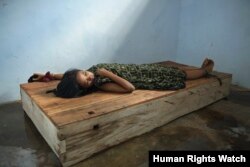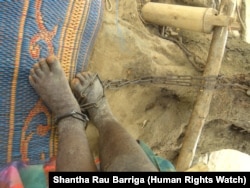A new Human Rights Watch (HRW) report details the shocking treatment of the mentally ill in Indonesia, where despite laws prohibiting it, thousands are chained to their beds or confined in small spaces, sometimes for years at a time.
The report, “Living in Hell,” documents the practice of pasung – isolating the mentally ill either by locking them in small rooms or restricting their movements by tying them up with rope or chains. HRW documented 175 cases of persons with psychosocial disabilities either in pasung or recently rescued from pasung. In one of the more extreme cases, a man was locked in a room for 15 years. Another case involved a 24-year old woman suffering from depression after her husband abandoned her and her small child. Photos show her shackled to a wooden platform that serves as a bed.
At least 18,800 people currently live in pasung in Indonesia, according to the report.
Sadly, the phenomenon isn’t unique to Indonesia, said Shantha Rau Barriga, director of HRW’s disability rights division, who spoke to VOA by phone from Jakarta.
“HRW has documented shackling and other abuses against people with mental health conditions -- psychosocial disabilities -- in a range of countries," Barriga said. “We’ve documented it in Ghana and Somaliland. We’ve seen people locked up in institutions in Russia and Croatia. And we’ve seen abuses happening in prisons in the United States.”
Abuses, said Barriga, are widespread and because the victims are locked away, they remain “invisible.”
The problem is made worse by the stigma attached to mental illness and by an absence of community-based mental health care and support services.
“Sadly, there is so much misinformation and misperception about mental health,” said Barriga. “People in Indonesia and in many other countries see it not as a medical condition, but as a curse, or that the person is possessed by evil spirits.”
As a result, mentally ill individuals or their families may turn to spiritual healers or prayer for a “cure,” even when mental health care is available.
‘She’s a witch’
Barriga was among a group that earlier traveled to Ghana to document conditions at so-called “prayer camps” run by privately-owned evangelical Christian institutions and managed by self-proclaimed “prophets.”
“These are places where people might go to pray or seek solace during challenging times,” said Barriga. “A death in the family, the loss of a job, the diagnosis of a serious illness.”
These camps also contain segregated areas where people with mental disabilities are brought against their will and abandoned, sometimes for years at a time as detailed in a 2012 HRW report. Barriga describes a man who was shackled to a tree for five years, “urinating, defecating, all within the same three-foot radius.”
During the course of an interview with the head of one such camp, Barriga heard a child crying and asked who it was.
“Oh, that’s a witch,” the man told her. Barriga asked to meet her. The man walked Barriga to where a five-year-old girl was chained to the base of a tree.
“He told me that 95 percent of witches are girls,” she remembers. “So I asked him, are there any other witches at this camp? He pointed to a group of girls, ranging from about age from five to 11, saying, ‘She’s a witch, she’s a witch, she’s a witch.’”
Multiple treaties violated
The United Nations adopted the Convention on the Rights of Persons with Disabilities in late 2006, which calls on countries to promote, protect and ensure full human rights and freedoms by all persons with long-term disabilities – physical, mental, intellectual or sensory.
More than 160 countries have signed onto the treaty, which is only one of a number of treaties and conventions that apply in such cases. Shackling and other abuse of the mentally ill is not only a violation of this treaty, but the UN Convention Against Torture and the Convention on the Rights of the Child, says Barriga.
Indonesia banned the practice of pasung nearly 40 years ago, but clearly the government has not done enough to ensure it stops altogether, says Barriga. HRW is calling on Indonesia to enforce the ban by monitoring institutions where it is taking place and working to change attitudes toward mental illness at the community level.
“In the long term, we are calling on the Indonesian government and governments all around the world to shift away from automatically sending people to institutions and mental hospitals,” Barriga said, “toward a system of community-based mental health care, where people can live independently, make decisions for themselves and get the care services they might want.”
Studies have shown that in any given year, as much as a third of the world’s population suffers some form of a mental disorder. Two thirds of them don’t get the care they need and are at risk of abuse.












